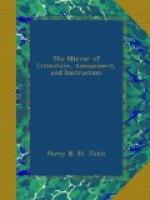Gentle reader, we are not about to direct your notice to the Temple Gardens, the olden feasts in our Law Halls—through which men ate their way to eminence—nor to prove that looking to a Chancellorship is woolgathering—nor to invite you to the shrubby groves of Lincoln’s Inn, or to promenade with the spirit of BACON in Gray’s Inn. All these may be pleasurable occupations; but there is mirth in store in the study of the Law itself, which is not “dull and crabbed as some fools (or knaves) suppose.”
In a recent Mirror, (No. 540) this may have been made manifest to the reader in the Legal Rhymes, quoted by our correspondent, W.A.R.;[9] but lo! here is a volume of evidence in “The Cenveyancer’s Guide;” a Poem, by John Crisp, Esq., of Furnival’s Inn; in which the art of Conveyancing is sung in Hudibrastic verse, and said in notes of pleasant prose. Happy are we to see Mr. Crisp’s volume in a third edition, since we opine from this success the bright moments of relief which his Muse may have shed upon the viginti annorum lucubrutiones of thousands of students. We have not space for quotations from the poem itself, in which Doe and Roe figure as heroes, with their occasional friend Thomas Stiles. We can only say their movements are sung with the terseness and point which we so much admire in the great originals, so as to make men acknowledge there is good in every thing. Our extracts are from the Introduction and Notes. First is
A LEGAL GLEE.
“A woman having a settlement,
Married a man with none,
The question was, he being dead,
If that she had was gone.
Quoth Sir John Pratt, her settlement
Suspended did remain,
Living the husband—but him dead,
It doth revive again.
“CHORUS OF PUISNE
JUDGES.
“Living the husband—but
him dead,
It doth revive again.”
[9] ERRATA in one of our correspondent’s “Legal
for “six beaches,” read “six braches.” for “book ycleped,” read “bock ylered.” for “token” read “teken.” for “Hamelyn” read “Howelin.”
Corrected from Blount’s Tenures, p. 665, ed. 1815.
A print of Westminster Hall, by Mosely, from a drawing made by Gravelot, who died in 1773, bears the following versified inscription:—
“When fools fall out, for ev’ry
flaw,
They run horn mad to go to law,
A hedge awry, a wrong plac’d gate,
Will serve to spend a whole estate.
Your case the lawyer says is good,
And justice cannot he withstood;
By tedious process from above,
From office they to office move,
Thro’ pleas, demurrers, the dev’l
and all,
At length they bring it to the Hall;
The dreadful hall by Rufus rais’d,
For lofty Gothick arches prais’d.




